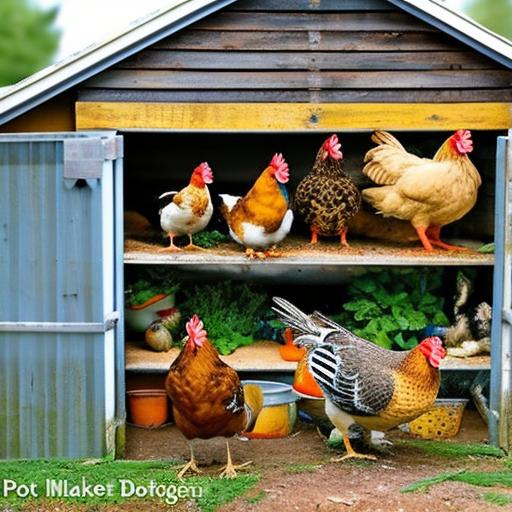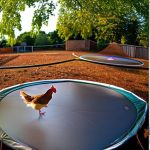Keeping chickens has a long history that dates back thousands of years. Originally, chickens were kept for their meat and eggs, providing a sustainable source of food for families. However, in recent years, there has been a growing trend of urban chicken keeping. People living in cities and suburbs are now raising chickens in their own backyards, and even in their garages.
The rise of urban chicken keeping can be attributed to several factors. First, there is a growing interest in sustainable living and self-sufficiency. Raising chickens allows individuals to have a direct source of fresh eggs and meat, reducing their reliance on store-bought products. Additionally, chickens provide other benefits such as pest control and fertilizer for gardens.
One unique aspect of urban chicken keeping is the practice of keeping chickens in garages. While traditional backyard coops are still popular, many people are finding that converting their garage into a chicken coop is a convenient and practical option. In this article, we will explore the benefits of keeping chickens in your garage, as well as the considerations and steps involved in planning for a garage chicken coop.
Key Takeaways
- Urban chicken keeping is a growing trend.
- Keeping chickens in your garage has benefits such as fresh eggs and pest control.
- Planning for a garage chicken coop requires consideration of space, ventilation, and lighting.
- Choosing the right breeds for garage chicken keeping is important for their health and productivity.
- Feeding, watering, and managing waste are important aspects of maintaining a happy and healthy flock in your garage.
Benefits of Keeping Chickens in Your Garage
There are several benefits to keeping chickens in your garage. One of the most obvious benefits is the availability of fresh eggs. Chickens are prolific layers, and a small flock can provide enough eggs to meet the needs of an average family. Having access to fresh eggs not only ensures a constant supply of high-quality protein but also allows you to enjoy the taste and nutritional benefits that come with them.
Another benefit of keeping chickens in your garage is pest control. Chickens are natural foragers and will eat insects, slugs, and other pests that may be present in your yard or garden. By allowing your chickens to roam freely in your garage or enclosed run, you can reduce the need for chemical pesticides and keep your garden healthy and pest-free.
Chickens also produce a valuable byproduct – their waste. Chicken manure is rich in nutrients and makes an excellent fertilizer for your garden. By keeping chickens in your garage, you can easily collect their waste and use it to enrich your soil. This not only reduces the need for synthetic fertilizers but also helps to create a more sustainable and environmentally friendly garden.
In addition to the practical benefits, keeping chickens in your garage can also provide educational opportunities for children. Children can learn about responsibility, animal care, and the cycle of life by being involved in the care of chickens. They can also learn about where their food comes from and gain a greater appreciation for the natural world.
Planning for a Garage Chicken Coop: Space, Ventilation, and Lighting
Before converting your garage into a chicken coop, there are several factors to consider. The first is how much space your chickens will need. Chickens require a minimum of 4 square feet per bird in the coop, and 10 square feet per bird in the run. If you have limited space in your garage, you may need to adjust the number of chickens you keep or consider alternative housing options.
Proper ventilation is essential for a healthy flock. Chickens produce a lot of moisture through their droppings and respiration, which can lead to high humidity levels in the coop. This can result in respiratory issues and other health problems for the chickens. To ensure good ventilation, you should have windows or vents that can be opened to allow fresh air to circulate.
Lighting is another important consideration when planning for a garage chicken coop. Chickens require a certain amount of light each day to stimulate egg production. Ideally, they should receive 14-16 hours of light per day. If your garage does not have access to natural light, you will need to provide artificial lighting using timers or other devices.
Choosing the Right Breeds for Garage Chicken Keeping
When choosing breeds for garage chicken keeping, there are several factors to consider. First, you will want to select breeds that do well in small spaces. Some breeds are more adaptable to confinement and will be happier and healthier in a garage coop. Bantam breeds, such as Silkies or Seramas, are good options for small spaces.
If you are primarily interested in egg production, you will want to choose breeds that are known for their high egg-laying capabilities. Breeds such as Leghorns, Rhode Island Reds, or Sussex are known for their prolific egg production and can provide you with a steady supply of fresh eggs.
Finally, it is important to choose breeds that are friendly and easy to handle. This is especially important if you have children who will be interacting with the chickens. Some breeds, such as Orpingtons or Australorps, are known for their docile and friendly nature, making them a good choice for families.
Feeding and Watering Your Garage Chickens
Feeding your chickens a balanced diet is essential for their health and productivity. A good quality commercial chicken feed should make up the majority of their diet. This feed should contain the necessary nutrients, vitamins, and minerals that chickens need to thrive. You can also supplement their diet with kitchen scraps, fruits, vegetables, and grains.
Providing clean water is also crucial for your chickens’ health. Chickens need access to fresh water at all times, so it is important to regularly clean and refill their water containers. You can use traditional waterers or invest in automatic watering systems that provide a constant supply of clean water.
To prevent food waste, it is important to feed your chickens the appropriate amount of food. Overfeeding can lead to obesity and health problems, while underfeeding can result in malnutrition and decreased egg production. It is best to follow the feeding guidelines provided by the feed manufacturer and monitor your chickens’ weight and overall health.
Health and Safety Considerations for Garage Chicken Keeping

Like any other animal, chickens are susceptible to various health issues. It is important to be aware of common chicken illnesses and take steps to prevent and treat them. Some common health issues in chickens include respiratory infections, parasites, and egg-laying problems.
To prevent respiratory infections, it is important to provide good ventilation in your garage coop. This will help to reduce moisture levels and prevent the buildup of ammonia from chicken droppings. Regular cleaning of the coop and proper hygiene practices, such as washing your hands after handling chickens, can also help to prevent the spread of disease.
Parasites, such as mites and lice, can be a problem in chicken coops. Regularly inspecting your chickens for signs of infestation, such as feather loss or redness on the skin, can help you catch and treat these issues early. There are various treatments available, including powders, sprays, and dust baths, that can help to control parasites.
Egg-laying problems can also occur in chickens. Some hens may experience issues such as egg binding or soft-shelled eggs. Providing a balanced diet, ensuring proper lighting conditions, and monitoring your hens’ overall health can help to prevent these problems. If you notice any abnormalities in your hens’ egg production, it is best to consult with a veterinarian.
Safety precautions should also be taken when handling chickens. Chickens have sharp beaks and claws that can cause injury if not handled properly. It is important to handle chickens gently and avoid any sudden movements that may startle them. Wearing gloves when handling chickens can also help to protect your hands from scratches or bites.
Managing Chicken Waste in Your Garage
Managing chicken waste is an important aspect of garage chicken keeping. Chicken manure is a valuable resource that can be composted and used as fertilizer for your garden. Composting chicken manure helps to break down the waste and reduce odor, making it safe to use in your garden.
To compost chicken manure, you will need a compost bin or pile. You can add other organic materials, such as leaves or grass clippings, to the compost to help balance the carbon-to-nitrogen ratio. It is important to regularly turn the compost pile to ensure proper decomposition and prevent the buildup of harmful bacteria.
Keeping your coop clean is also important for managing chicken waste. Regularly removing soiled bedding and replacing it with fresh bedding can help to reduce odors and prevent the buildup of bacteria. It is also important to regularly clean and disinfect waterers and feeders to prevent the spread of disease.
Using chicken waste as fertilizer is a sustainable and environmentally friendly practice. Chicken manure is rich in nitrogen, phosphorus, and potassium, which are essential nutrients for plant growth. By using chicken manure as fertilizer, you can improve soil fertility, increase crop yields, and reduce the need for synthetic fertilizers.
Legal Considerations for Keeping Chickens in Your Garage
Before embarking on garage chicken keeping, it is important to familiarize yourself with local laws and regulations regarding keeping chickens. Some cities or neighborhoods may have restrictions on the number of chickens you can keep or may require permits or licenses.
Zoning restrictions may also apply, especially if you live in a residential area. Some areas may have specific zoning regulations that prohibit the keeping of livestock or poultry. It is important to check with your local zoning department to ensure that you are in compliance with any regulations.
In addition to local laws and regulations, it is also important to consider your neighbors when keeping chickens in your garage. Chickens can be noisy, especially when they are laying eggs or if they feel threatened. It is important to be considerate of your neighbors and take steps to minimize noise, such as providing a quiet and secure coop.
Tips for Maintaining a Happy and Productive Flock in Your Garage
Maintaining a happy and productive flock in your garage requires some effort and attention. Providing entertainment for your chickens can help to keep them stimulated and prevent boredom. This can be as simple as providing perches or roosts for them to climb on, or as elaborate as creating a chicken playground with tunnels and obstacles.
Keeping your coop clean and organized is also important for maintaining a healthy flock. Regularly cleaning out soiled bedding, removing any debris or waste, and disinfecting the coop can help to prevent the buildup of bacteria and reduce the risk of disease. It is also important to regularly check for any signs of damage or wear and tear in the coop and make any necessary repairs.
Monitoring your flock’s health is crucial for early detection and treatment of any health issues. Regularly inspecting your chickens for signs of illness, such as changes in behavior, appetite, or appearance, can help you catch and address any problems early. It is also important to keep records of your chickens’ health, including vaccinations, treatments, and any abnormalities you observe.
Is Garage Chicken Keeping Right for You?
In conclusion, garage chicken keeping offers many benefits, including a constant supply of fresh eggs, pest control, fertilizer for your garden, and educational opportunities for children. However, it is important to carefully plan and consider the space, ventilation, lighting, breeds, feeding and watering, health and safety considerations, waste management, legal considerations, and tips for maintaining a happy and productive flock.
Before embarking on garage chicken keeping, it is recommended that you do further research and consider if it is the right fit for you and your family. While there are many benefits to keeping chickens in your garage, it also requires time, effort, and commitment to ensure the health and well-being of your flock. By taking the necessary steps and precautions, you can enjoy the rewards of garage chicken keeping and experience the joys of sustainable living.
If you’re considering keeping chickens in your garage, you may also be interested in learning about the breeding habits of guinea fowl. Guinea fowl are known for their unique and beautiful eggs, but when do they actually lay them? Find out more in this informative article on poultrywizard.com. Additionally, if you’re thinking about expanding your poultry collection, understanding the mating season for turkeys is crucial. Discover the best time for turkey breeding in this helpful resource on poultrywizard.com. And if you’re looking for a convenient way to keep chickens without building a coop, consider renting a chicken coop. Learn more about this innovative solution at poultrywizard.com.
FAQs
Can you keep chickens in your garage?
Yes, it is possible to keep chickens in your garage. However, there are certain factors to consider before doing so.
What are the factors to consider before keeping chickens in your garage?
Some of the factors to consider include the size of your garage, ventilation, lighting, temperature, and cleanliness. Chickens require adequate space, fresh air, and proper lighting to thrive.
What kind of setup do you need to keep chickens in your garage?
You will need a coop or a cage for your chickens, as well as a nesting box, food and water containers, and bedding material. You may also need to install a heat lamp or a heater to maintain a comfortable temperature for your chickens.
What kind of chickens are suitable for keeping in a garage?
Bantam chickens or smaller breeds are more suitable for keeping in a garage due to their size. They also require less space and can adapt to indoor environments more easily.
What are the benefits of keeping chickens in your garage?
Keeping chickens in your garage can provide you with fresh eggs, fertilizer for your garden, and a source of entertainment. It can also be a fun and educational activity for children.
Are there any downsides to keeping chickens in your garage?
Yes, there are some downsides to keeping chickens in your garage. They can be noisy and messy, and their droppings can produce strong odors. They also require daily care and attention, which can be time-consuming.
Meet Walter, the feathered-friend fanatic of Florida! Nestled in the sunshine state, Walter struts through life with his feathered companions, clucking his way to happiness. With a coop that’s fancier than a five-star hotel, he’s the Don Juan of the chicken world. When he’s not teaching his hens to do the cha-cha, you’ll find him in a heated debate with his prized rooster, Sir Clucks-a-Lot. Walter’s poultry passion is no yolk; he’s the sunny-side-up guy you never knew you needed in your flock of friends!







